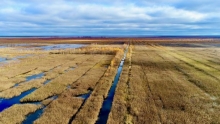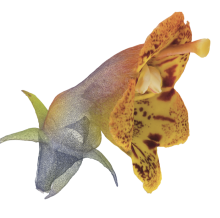Wetlands are among the most threatened ecosystems in the world. A new study, published in Nature, has found that the loss of wetland areas around the globe since 1700 has likely been overestimated. This is good news overall, however, the global picture hides significant variations, with several regions and distinct wetland types under significant levels of pressure. For instance, temperate river floodplains have been highly impacted while remote boreal-arctic peatlands remain comparatively unharmed.

Assessment, testing, and clean-up are well underway in the Stewart Biology Building, following the flooding on Sunday caused by burst pipes. As many of you are aware, the building contains asbestos, as do many buildings of its era. Out of an abundance of caution, testing protocols and follow-up cleaning procedures (where indicated by test results) have therefore been undertaken in the affected areas. As some public access areas have also been affected, the entire building complex has been shut until testing and clean-up have been completed.
Extreme temperatures over the weekend have caused pipes to burst in the Stewart Biology Building.
It will take at least two more days to complete the clean-up and thoroughly assess the extent of the damage. Therefore, the building (North and South blocks) will remain closed until at least Thursday morning.

Data and collaboration are key in science – so why not use both to drive change in teaching and learning at the Faculty of Science at McGill? FSCI 396 – Research Project in Science Teaching and Learning is a course that partners undergraduate students and instructors to design and assess learning opportunities, resulting in improvements for everyone.

Snakes and mice don’t look alike. But much of what we know about skin colouration and patterning in vertebrates generally, including in snakes, is based on lab mice. However, there are limits to what mice can tell us about other vertebrates because they don’t share all of the same types of colour-producing cells, known as chromatophores. For example, snakes have a type of chromatophore called iridophores that can generate iridescent colours by reflecting light.

Karine Auclair, professor in the Department of Chemistry, is the 2023 recipient for the Clara Benson Award from the Chemical Institute of Canada (CIC).
Sponsored by the Canadian Council of University Chemistry Chairs (CCUCC), the Clara Benson Award is presented to recognize a woman who has made a distinguished contribution to chemistry while working in Canada.
Here is what the CIC had to say about Auclair's work:

Congratulations to Professor Christian Genest on being awarded the 2023 CRM-Fields-PIMS Prize! The CRM-Fields-PIMS prize is the premier Canadian award for research achievements in the mathematical sciences.

The 2022 United Nations Biodiversity Conference of the Parties (COP15) was held in Montreal on December 7-19, 2022. The conference’s outcome agreement, known as “30×30” means the protection of 30 per cent of land and oceans by 2030.
Two highly accomplished researchers in McGill’s Department of Physics have received prestigious distinctions for their research

Each year, around 1,000 new students begin an undergraduate science degree at McGill. For many of them, their first year at university represents a dramatic change from the world of high school or CEGEP.
“The workload, the amount of new content you get, and a different style of testing” are three of the challenges Marie Walker recalls from her first semester as a science undergrad.

To better understand the evolution of flowers, a research team in biology from Université de Montréal , the Montréal Botanical Garden, and McGill University (Daniel Schoen, Biology) have succeeded in using photogrammetry to quickly and precisely build, in three dimensions, a model of a flower from two-dimensional images.
Photogrammetry is commonly used by geographers to reconstruct the topography of a landscape. However, this is the first time that scientists have used the technique to design 3D models of flowers in order to better study them.

Did you know... McGill students have access to 20 GB FREE personal file space on OneDrive, Microsoft’s cloud file storage component of the Office 365 package.
Important: New OneDrive storage capacity
Please note that students admitted on and after December 11th, 2023, receive 20GB of storage for McGill's OneDrive as well as 20GB storage for McGill's email (Outlook).
For now, the storage capacity allotted to students admitted before that date will not be affected.
- BCom Program
- Dept. of Integrated Studies in Education
- Dept. of Educational and Counselling Psychology
- Faculty of Education
- IT Services
- Dept. of Kinesiology and Physical Education
- Law Grad Studies
- Law student affairs
- MBA Program
- Inst. for Gender/Sexuality/Feminist Studies
- Desautels Faculty of Management
- Faculty of Science
- School of Communication Sciences and Disorders
- Teaching and learning

Lizz Webb, a PhD student in the Department of Atmospheric and Oceanic Sciences (and OSE Science Education Fellow) here at McGill University, spent a week in Svalbard, a Norwegian archipelago barely 1,000 kilometres from the North Pole, as part of her studies.

As Montreal prepares to host UN Biodiversity Conference, McGill professor Andrew Gonzalez discusses how cities can help protect nature and human health.
Global urban populations are projected to increase to nearly five billion by 2030. This ever-expanding urbanization threatens our world’s plant and animal biodiversity and degrades ecosystems through the loss of habitat, biomass and carbon storage. As noted during the recent COP27 climate conference, biodiversity loss is as critical to our planet’s health as the climate crisis.

A silent mass extinction is occurring in lakes, rivers and wetlands. Freshwater species are rapidly disappearing in North America and throughout the world. Conservation-minded people might be unaware of this, because of the media’s longstanding focus on land-based ecosystems and charismatic animals.
